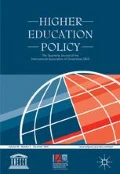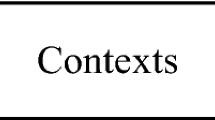Abstract
Learning outcomes assessment is a consequential issue in U.S. higher education. Driven by calls for accountability from accreditation agencies, federal and state actors, and other stakeholders, and criticism about the value of higher education, there is currently heightened interest in the attainment of learning outcomes along with the use of this evidence by colleges and universities to improve student learning. This chapter traces the establishment of learning outcomes assessment in U.S. higher education, describes the more influential and enduring initiatives, elaborates their role and impact on learning outcomes assessment, and then discusses six issues that represent the unfinished agenda of student learning outcomes assessment. Although significant progress has been made over the last 3 decades to develop research-based and actionable approaches to learning outcomes assessment, and by all accounts, more assessment activity is occurring, challenges remain. Current approaches have yet to fully realize an integrated, systemic process for learning outcome assessment that engages educators in periodic, purposeful evaluation of student learning that can be used to demonstrate both what students know and can do and expose shortcomings in the learning experience that deserve to be addressed.
Similar content being viewed by others
References
Association of American Colleges and Universities (2018) A vision for equity, Washington, DC: Association of American Colleges and Universities.
Astin, A.W. (1977) Four critical years, San Francisco: Jossey-Bass.
Banta, T.W. (2006) ‘Reliving the history of large-scale assessment in higher education’, Assessment Update 18(4): 3–4, 15.
Banta, T.W. and Blaich, C.F. (2011) ‘Closing the assessment loop’, Change 43(1): 22–27.
Banta, T.W., Ewell, P.T. and Cogswell, C.A. (2016) Tracing Assessment Practice as Reflected in Assessment Update (NILOA Occasional Paper No. 28), Urbana, IL: University of Illinois and Indiana University, National Institute for Learning Outcomes Assessment.
Banta, T.W. and Palomba, C.A. (2015) Assessment essentials (2nd ed.), San Francisco, CA: Jossey-Bass.
Banta, T. and Pike, G. (2012) ‘Making the Case Against—One More Time’, in R. Benjamin (ed). The Seven Red Herrings about Standardized Assessments in Higher Education, NILOA Occasional Paper No. 15, Urbana, IL: University of Illinois and Indiana University, National Institute for Learning Outcomes Assessment, pp. 24–30.
Borden, V.M. and Kernel, B. (2013) Measuring quality in higher education: An inventory of instruments, tools, and resources. Retrieved from http://apps.airweb.org/surveys/Default.aspx.
Borden, V.M. and Owens, J.L. (2001) Measuring quality: Choosing among surveys and other assessments of college quality, Washington, DC: American Council of Education and Association of Institutional Research.
Bogue, E. (2002) ‘Twenty years of performance funding in Tennessee’, in J.C. Burke (ed). Performance Funding/or Public Higher Education: From Fad to Trend, Albany: State University of New York Press.
Bowen, H. (1977) Investment in learning, San Francisco: Jossey-Bass.
Brown, J., Kurzweil, M. and Pritchett, W. (2017) Quality Assurance in US Higher Education The current landscape and principles for reform, New York: Ithaka S + R.
Carnevale, A.P., Cheah, B. and Hanson, A.R. (2015) The economic value of college majors, Washington DC: Georgetown University Center on Education and the Workforce.
Commission on the Future of Higher Education, Secretary of Education, U.S. Department of Education. (2006) A test of leadership: Charting the future of U.S. higher education, Washington, DC: U.S. Department of Education.
Council for Higher Education Accreditation (CHEA). (2016) Ten ways in which accreditation serves students, society, and the public interest, Washington, DC.
Ewell, P.T. (2002) ‘An emerging scholarship: A brief history of assessment’, in T.W. Banta (ed). Building a Scholarship of Assessment, San Francisco, CA: Jossey-Bass, pp. 3–25.
Ewell, P.T. (2008) U.S. accreditation and the future of quality assurance, Washington, DC: Council for Higher Education Accreditation.
Ewell, P.T. (2009) Assessment, Accountability, and Improvement: Revisiting the Tension (NILOA Occasional Paper No. 1), Urbana, IL: University of Illinois and Indiana University, National Institute for Learning Outcomes Assessment.
Ewell, P.T. (2010) ‘The U.S. National Survey of Student Engagement (NSSE)’, in D.D. Dill and M. Beerkens (eds). Public Policy for Academic Quality: Analyses of Innovative Policy Instruments, New York, NY: Springer, pp. 83–97.
Ewell, P.T. (2011) ‘Assessing student learning outcomes in college: The role of the states’, in D.E. Heller (ed). The States and Public Higher Education Policy, Second Edition. Baltimore, MD: The Johns Hopkins University Press.
Ewell, P.T. and Boeke, M. (2007) Critical connections: Linking states’ unit record systems to track student progress, Indianapolis, IN: Lumina Foundation for Education.
Feldman, K. and Newcomb, T. (1969) The impact of college on students, San Francisco: Jossey-Bass.
Gannon-Slater, N., Ikenberry, S., Jankowski, N. and Kuh, G. (2014) Institutional assessment practices across accreditation regions, Champaign, IL: National Institute for Learning Outcomes Assessment.
Gaston, P. (2018) Assessment and accreditation: An imperiled symbiosis, Urbana, IL: University of Illinois and Indiana University, National Institute for Learning Outcomes Assessment.
Gaston, P. (2014) Higher education accreditation: How it’s changing, why it must, Sterling, VA: Stylus Publishing LLC.
Green, M.F. and Bezbatchenko, A.W. (2014) ‘An alternative model of philanthropy’, Change 46(1): 46–52.
Hutchings, P. (2009) ‘The new guys in assessment town’, Change 41(3): 26–33.
Iannone, C. (2009) ‘Old ills, new remedies: A conversation with Diane Auer Jones’, Academic Questions 22(3): 351–368.
Jankowski, N., Hutchings, P., Ewell, P., Kinzie, J. and Kuh, G. (2013) ‘The degree qualifications profile: What it is and why we need it now’, Change 45(6): 6–15.
Jankowski, N. A., Timmer, J. D., Kinzie, J. and Kuh, G. D. (2018) Assessment that matters: Trending toward practices that document authentic student learning, Urbana, IL: University of Illinois and Indiana University, National Institute for Learning Outcomes Assessment.
Kelly, A. P. and Adelman, C. (2010) False fronts? Behind higher education’s voluntary accountability system, Washington, DC: Education Sector and American Enterprise Institute.
Kinzie, J., Hinds, T.L., Jankowski, N.A. and Rhodes, T.L. (2017) ‘Recognizing excellence in assessment’, Assessment Update 29(1): 1–16.
Klein, S., Benjamin, R. and Shavelson, R. (2007) ‘The collegiate learning assessment: Facts and fantasies’, Evaluation Review 31(5): 415–439.
Klein, S., Liu, O.L. and Sconing, J. (2009) Test validity study (TVS) report, Washington, DC: Fund for the Improvement of Postsecondary Education (FIPSE). Retrieved from https://cp-files.s3.amazonaws.com/26/TVSReport_Final.pdf.
Kuh, G.D. and Ikenberry, S.O. (2009) More than you think, less than we need: Learning outcomes assessment in American higher education, Urbana, IL: University of Illinois and Indiana University, National Institute for Learning Outcomes Assessment.
Kuh, G.D. and Ikenberry, S. (2018) NILOA at ten: A retrospective, Urbana, IL: University of Illinois and Indiana University, National Institute for Learning Outcomes Assessment.
Kuh, G.D., Ikenberry, S.O., Jankowski, N.A., Cain, T.R., Ewell, P. Hutchings, P. and Kinzie, J. (2015) Using evidence of student learning to improve higher education, San Francisco, CA: Jossey-Bass.
Kuh, G.D., Jankowski, N., Ikenberry, S.O. and Kinzie, J. (2014) Knowing what students know and can do: The current state of learning outcomes assessment at U.S. colleges and universities, Urbana, IL: University of Illinois and Indiana University, National Institute for Learning Outcomes Assessment.
Leatherman, C. (1994) ‘Accreditors fight back’, Chronicle of Higher Education, 9 February. Retrieved from https://www.chronicle.com/article/Accreditors-Fight-Back/92655/.
Lingenfelter, P.E. (2016) “Proof,” policy & practice: Understanding the role of evidence in improving education, Sterling, VA. Stylus.
Lumina Foundation for Education (2014) The Degree Qualifications Profile 2.0, Indianapolis, IN: Lumina Foundation for Education.
Mayhew, M.J., Rockenbach, A.N., Bowman, N.A., Seifert, T.A., Wolniak, G.C., with Pascarella, E.T., Terenzini, P.T. (2016) How college affects students: Vol. 3. 21st century evidence that higher education works, San Francisco, CA: Wiley.
Miller, M.A. and Ewell, P.T. (2005) Measuring up on college-level learning, San Jose, CA: The National Center for Public Policy in Higher Education.
National Center for Public Policy and Higher Education (2008) Measuring up 2008, San Jose, CA: National Center for Public Policy and Higher Education.
National Center for Public Policy and Higher Education (2000) Measuring up 2000: The state-by-state report card for higher education, San Jose, CA: National Center for Public Policy and Higher Education.
National Governors Association (1986) Time for results: The Governors’ 1991 report on education, Washington, DC: National Governors Association.
National Institute for Learning Outcomes Assessment (2011) Transparency framework, Urbana, IL: University of Illinois and Indiana University, National Institute for Learning Outcomes Assessment.
National Institute of Education, Study Group on the Conditions of Excellence in American Higher Education (1984) Involvement in learning: Realizing the potential of American higher education, Washington, DC: U.S. Government Printing Office.
Neuman, W.R. (2017) ‘Charting the future of US higher education: A look at the spellings report ten years later’, Liberal Education 103(1): 6–13.
Pace, C.R. (1979) Measuring the outcomes of college, San Francisco: Jossey-Bass.
Pascarella, E. and Terenzini, P. (1991) How college affects students, San Francisco: Jossey-Bass.
Pascarella, E. and Terenzini, P. (2005) How college affects students (Vol. 2): A third decade of research, San Francisco: Jossey-Bass.
Provezis, S. (2010) Regional Accreditation and Student Learning Outcomes: Mapping the Territory (NILOA Occasional Paper No. 6), Urbana, IL: University of Illinois and Indiana University, National Institute for Learning Outcomes Assessment.
Rhodes, T. (2009) ‘The VALUE project overview’, Peer Review 11(1): 4–7.
Trostel, P. (2017) ‘The tip of the Iceberg’, Change 49(3): 8–18.
U.S. Department of Education, National Center for Education Statistics (2017) The Condition of Education 2017 (NCES 2017-144), Undergraduate Retention and Graduation Rates, Washington, DC: U.S. Department of Education.
U.S. Department of Education, National Commission on Excellence in Education (1983) A nation at risk: The Imperative for educational reform, Washington, DC: U.S. Government Printing Office.
Author information
Authors and Affiliations
Corresponding author
Ethics declarations
Conflict of interest
On behalf of all authors, the corresponding author states that there is no conflict of interest.
Additional information
Publisher's Note
Springer Nature remains neutral with regard to jurisdictional claims in published maps and institutional affiliations.
Rights and permissions
About this article
Cite this article
Kinzie, J. Taking Stock of Initiatives to Improve Learning Quality in American Higher Education Through Assessment. High Educ Policy 32, 577–595 (2019). https://doi.org/10.1057/s41307-019-00148-y
Published:
Issue Date:
DOI: https://doi.org/10.1057/s41307-019-00148-y




